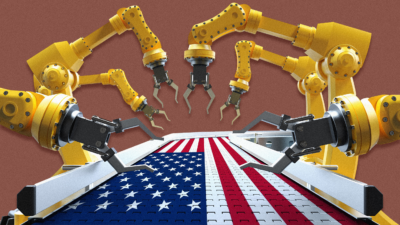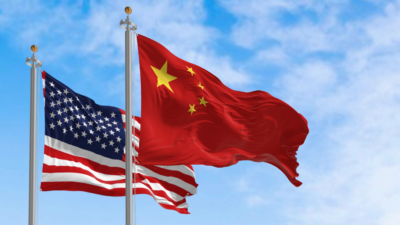Happy Tariff Tuesday?
The latest data suggests markets and manufacturers aren’t taking Trump’s tariffs on Mexico, Canada, and China all that well.
Sign up for smart news, insights, and analysis on the biggest financial stories of the day.
Good morning, ¡Buenos!, Bonjour, and 早上好 (zǎo shàng hǎo). Today, those sunrise greetings come with a rude awakening.
President Donald Trump said yesterday that he will level tariffs on imports from Canada and Mexico as of today, and increase existing levies on goods from China. The latest data suggests markets and manufacturers aren’t taking it especially well.
‘The Largest Tax Increase in at Least a Generation’
For those who live under a rock: Last month, President Trump delayed his order to impose 25% tariffs on goods from Canada and Mexico — except for Canadian energy, which will be taxed at 10% — by 30 days. He also said he plans to double a 10% tariff on China. Combined, those measures would impact nearly $1.5 trillion in imports. The Peterson Institute, a DC-based economics think tank, estimated last month that this will cost the average US household $1,200 per year in what it called the “largest tax increase in at least a generation.”
On top of the impact on consumers, Canada laid out a list of ready-to-deploy retaliatory measures last month, Mexico said it would respond with measures when appropriate, and China hit back with reciprocal tariffs — all of which will impact the $1 trillion in goods those countries buy from US companies, potentially impacting their bottom line. Goldman Sachs analysts warned in a note that tariff increases and retaliatory measures could both “hurt domestic production.” The coming tariff tsunami combined with less than upbeat economic data resulted in a blue Monday on Wall Street:
- Fresh off a down month in February, stocks kept sliding Monday in their March debut. The Dow Jones Industrial Average fell 1.5%, the S&P 500 1.7% and the tech-heavy Nasdaq dropped 2.6% — UBS Global Wealth Management analysts said in a note that stocks are “likely to be volatile.”
- Just as the stock market has had a rough start to 2025, so has economic data: The Institute of Supply Management (ISM) released its latest Manufacturing Purchasing Managers Index (PMI) report on Monday, showing a dip in the manufacturing sector. The important economic indicator remained above the crucial 50 point — anything below indicates contraction in the sector — but still fell to 50.3 from 50.9, a lower level than the 50.7 analysts expected. ING noted “huge drops in new orders and employment within the ISM report.”
ING economist James Knightley wrote that “the stop-start/will he-won’t he nature of tariffs is creating uncertainty with manufacturers seemingly concerned about the trading environment they will find themselves in.”
Taking Advantage: Economic research has shown companies will raise prices simply because they can, not just if they need to. For example, Harvard Business School and Georgetown researchers found US companies raised prices between 2006 and 2019 even when costs fell. Economists have argued for and against the idea that companies helped inflame inflation during recent record profit years. The Peterson Institute said US domestic producers could “increase their prices in line with import price increases,” which they said would add “insult to injury for US consumers” already paying more.












